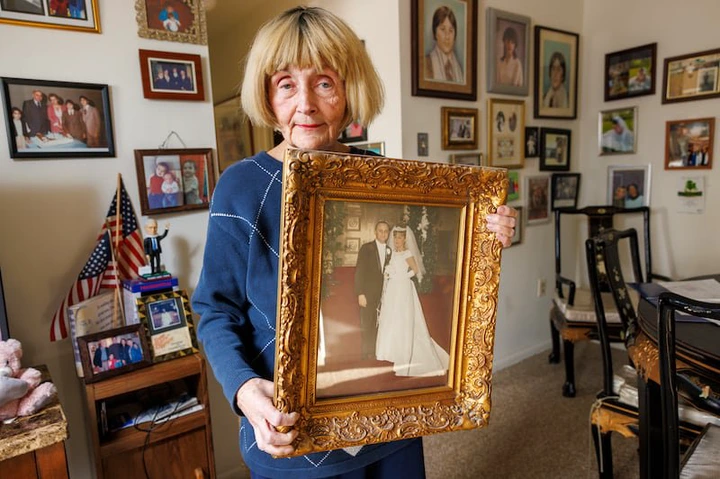A woman from Northeast Philadelphia had taken care of her husband's burial expenses long before his passing. However, when the time came for his burial, she was unexpectedly required to make another payment.

View pictures in App save up to 80% data.
As the new millennium approached, Marlyn and Herbert Harris found themselves surrounded by a lively group of grandchildren, an adventurous lifestyle filled with travel, and a deep, enduring love in their marriage that had lasted for many years, giving them countless reasons to cherish life.
Despite those fortunes, the couple from Northeast Philadelphia couldn't shake their thoughts about mortality.
In 2001, they took the initiative to organize their funeral plans ahead of time, choosing their headstones and burial sites, and crucially, settling the payment for the entire package in advance.
However, Marlyn Harris is currently grappling with the loss of her 95-year-old husband, who passed away in January 2024. On top of her grief, she is facing a demand to pay hundreds of dollars for burial services that she thought had been settled over twenty years ago.
Five years after Wertheimer Monuments became the subject of an Inquirer investigation for failing to deliver monuments to grieving customers, the embattled Upper Darby company and its owner, Larry Moskowitz, are again the recipients of consumer complaints, according to state prosecutors.
Ernest Petersen, the president of the Pennsylvania Cemetery Cremation and Funeral Association, remarked that although cases like Harris' are uncommon, they do occur in the funeral industry. He noted that monument companies often face less regulation compared to cemeteries and funeral homes.
Customers persisted in voicing their grievances regarding Wertheimer well beyond the 2020 report by The Inquirer; it wasn't until last year that the Pennsylvania Attorney General's Office took action against the monument company's questionable business practices.
Although Harris faced a request for payment twice, others have voiced their frustrations over excessive delays in receiving headstones for their loved ones, in addition to experiencing inadequate communication from the company during their difficult emotional periods.
At the same time, ongoing issues with Wertheimer, established in 1929 and recognized as one of Philadelphia's final significant institutions honoring the Jewish community, continue to cause distress for clients such as Harris.
Settled completely
As Herbert Harris' yahrzeit approaches—a significant death anniversary in Jewish tradition—Marlyn Harris is expected to unveil his monument. However, the grave of the Korean War veteran is still without a marker.
“I light my candles every Friday evening for the Sabbath, and I used to express my gratitude by saying, ‘Thank you, God, for blessing me with a husband like mine,’” Harris shared. “Now, my prayer has changed to, ‘God, please let him find peace in rest.’”
In her Northeast Philadelphia apartment, adorned with family photographs, 84-year-old Harris beams when she reminisces about her late husband. She recalls how his relaxed outlook on life remained constant, even during his formal career as a tax agent.
The pair married in 1965, traveled to exotic destinations based on suggestions from her husband’s beloved National Geographic, and shared three children and seven grandchildren.
Marlyn Harris vividly remembers the surprise she felt last March upon receiving a bill from Wertheimer asking for two extra checks amounting to over $900.
According to the latest invoice, Harris not only owed Moskowitz $65 for an artistic depiction of the inscription on Herbert's monument, but also $850 to King David Cemetery in Bensalem for the base that would secure Herbert Harris' monument at his gravesite.
Nonetheless, on her Wertheimer invoice from 2001, there is a stamp that says “PAID IN FULL” placed next to her payment of $1,635.
Further down on the document, it states: "This includes the foundation, lettering, and full installation at the cemetery."
Moskowitz, who acquired Wertheimer in 2018 and also possesses Har Jehuda Cemetery in Upper Darby, indicated that the prior ownership of the monument company was to blame for the misunderstanding.
“Moskowitz mentioned to The Inquirer, 'They never set aside the funds to provide it later on.'”
Moskowitz mentioned that since covering the foundation expenses out of his own funds wasn't practical, he was requesting Harris to issue the check to King David.
When Moskowitz acquired the company, Harris' arrangement was among approximately 125 exceptional prepaid burial orders.
The business ow